美国金融危机英语作文2
美国经济大萧条英文介绍

美国经济⼤萧条英⽂介绍Economic crisisIn October 24, 1929, American black Thursday, crazy stock trend suddenly appeared in the New York stock exchange, trading a total of nearly 13000000 shares of stock, beyond more than 10 times of the normal daily trading volume. In financial speculation and bubble economy, the soared stock price now moved so that it can not keep up with the speed of price quotes. With many people in bankruptcy with a mountain of debt, even 8 people killing themselves on the day because of Dutch act of debt, the financial panic started. However, this was the largest , the longest, and the worst start of economic crisis in the history of capitalism. In the following four years, the capitalist world sank into the global crisis economically, socially and politically , has been a huge impact, precarious.On the Black Thursday, at 12 o’clock noon, a number of Wall Street financial giants in the Morgan Foundation Office held an emergency meeting, deciding to raise money to save the market. Two days later, the situation temporarily stabilized. But on 28th, Monday, with the wind coming again, 9,250,000 stocks sprung out such as the flood and the financial giants finally were unable to resist with wealth exhaustion, and they issued a statement at night: give up the rescue and panic is unstoppable to come. The next day, Tuesday, at 10 o’clock in the morning, with the stock market opening and the Gong ringing, large amounts of stock was thrown out, even at any price, but not many people wanted to buy with the chaotic scene. At the beginning of stock opening, 3000000 shares were thrown out, reaching more than 8000000 shares two hours later, and more than 12,000,000 stocks closed at one thirty. when shares reached16,410,000 , the stock market finally collapsed and the stock marketfell by12.82%. Hundreds of billions of dollars instantly became nothing and economic crisis has opened a prelude. Later on, the stock continually plunged with stock index 100 points in 1926, 145 points in November 1929 , 102 points in December 1930, and falling to 54 points in December 1931. Until 1933, the situation was extremely serious, even falling to 34 points in June, finally the index had lost 5/6. Nearly one hundred billion U.S. assets burst miraculously disappeared such as soap bubbles. From September in 1929 to January 1933, thirty kinds of stocks fell by 82.8%, from the average of $364.9 to $62.7. In the meanwhile, 20 kinds of railway stock from an average of $180 per share to $28.1, decreasing by 84.4%.The crisis heavily hit the United States firstly, thousands of factories and banks collapsed. There were 26400 companies and 934 banks broken In 1930. In 1931, 28300 companies and 1440 banks failed; In 1932, 31300 companies and 1453 banks failed; In 1933, 20300 companies and 1783 banks also failed. People rushed into banks in a panic to draw a large number of deposits, which caused a great loss of gold reserves as well as capital output sharply decreased nearly being stopped..In early 1933, all banks in the United States were out of business basically . Finance was just the nerve center of modern economy,and its paralysis inevitably led to the entire national economic havoc and the economy in the United States almost collapses, which resulted in continuous decline in America's GDP. In 1929, GDP was $103.1 billion, $55.6 billion in 1933. During the past three years GDP has decreased by half. Ten years later, it went back to $99.6 billion in 1940.What is more , industrial production of USA in July 1932, has fallen to the bottom, contrast in May 1925, plummeted 55.6%, steel fell by nearly 80%, fell by 87% in the machine tool manufacturing, auto industry has declined by 95%.With the economic crisis leading to a large number of unemployed people, people's life became seriously poor and the unemployed in the United States had more than 400 in 1930 to 8 million people in 1931, breaking through the ten million mark in 1932. In 1933, the most serious unemployment went up to 17million, which means nearly a third of the workers in the United States. From October 1930 to March 1931, there were 223000 people out of work among 690,000 workers and 5,000 households losing their homes within only 6 days just were unable to pay the mortgage. The unemployed fully in urban and rural, cold, hunger, and homeless, have been admitted to the Hoover cottage made of wood, sheet metal or paper boxes and so on. The humble dwelling were called Hoover cottage, because when Hoover once was run for President of the United States, he had promised the workers that they could have the chicken to eat and cars to drive.Once in America, about 34,000,000 people had no income, accounting for 28% of the total population, and even a large number of schools went bust. In 1932, only New York, at one time, had more than 30 students out of school and millions of people relied on charity with fear and despair throughout the crisis. This is so called the history of the great tragedy of America.In the early twentieth century, there were a variety of latent crisis factors in America economic prosperity such as large gap between the rich and the poor, wealth is concentrated in a few rich people, so that the majority of people in lower class lacked purchasing power because of poverty. In 1929, the rich in USA, accounting for 5% of the population of the country, had a personal collection of 1/3. At thesame time, the poor households with the annual income of less than $2000 were up to 60% of the whole families. In addition, the number of the pre-crisis unemployment reached about 2,000,000. Another important factor is the rampant speculation, such as speculation frenzy of the stock and real estate , forming the bubble economy. The New York Stock Exchange listed shares increased to from 443,000,000 shares in January 1925 to more than 1,000,000,000 shares of stock in October 1929 , with the face value higher with 3 to 20 times, some even up to 50 times. The the doubled prices and a serious departure from the actual value, the stock eventually fell off a serious cliff on the Black Thursday in 1929.。
美国经济大萧条全英文
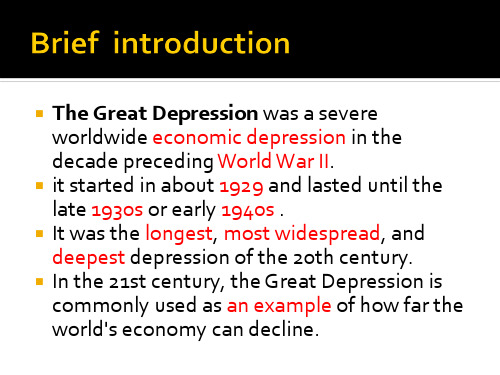
government intervenes to economy Keynesian['keinziən]
national macroeconomic adjust and control economic nationalism—tariffs Totalitarianism(极端主义)-Nazi Party 卍 Adolf Hitler&Benito Mussolini贝尼托·墨索里尼,
This study suggests that theories of the Great Depression have to explain an initial severe decline but rapid recovery in productivity, relatively little change in the capital stock, and a prolonged depression in the labor force.
Recent work from a neoclassical perspective focuses on the decline in productivity that caused the initial decline in output and a prolonged recovery due to policies that affected the labor market.
Demand-driven Keynesian Breakdown of international trade Debt deflation Monetarist New classical approach Austrian School Inequality Productivity shock
美国经济大萧条英文介绍讲述
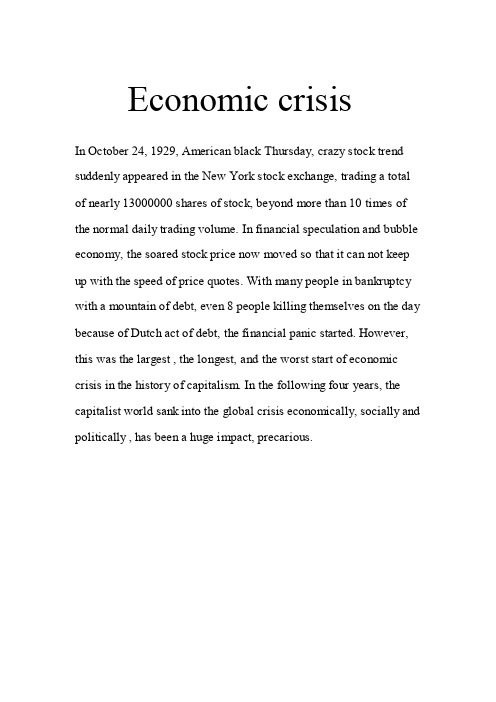
Economic crisisIn October 24, 1929, American black Thursday, crazy stock trend suddenly appeared in the New York stock exchange, trading a total of nearly 13000000 shares of stock, beyond more than 10 times of the normal daily trading volume. In financial speculation and bubble economy, the soared stock price now moved so that it can not keep up with the speed of price quotes. With many people in bankruptcy with a mountain of debt, even 8 people killing themselves on the day because of Dutch act of debt, the financial panic started. However, this was the largest , the longest, and the worst start of economic crisis in the history of capitalism. In the following four years, the capitalist world sank into the global crisis economically, socially and politically , has been a huge impact, precarious.On the Black Thursday, at 12 o’clock noon, a number of Wall Street financial giants in the Morgan Foundation Office held an emergency meeting, deciding to raise money to save the market. Two days later, the situation temporarily stabilized. But on 28th, Monday, with the wind coming again, 9,250,000 stocks sprung out such as the flood and the financial giants finally were unable to resist with wealth exhaustion, and they issued a statement at night: give up the rescue and panic is unstoppable to come. The next day, Tuesday, at 10 o’clock in the morning, with the stock market opening and the Gong ringing, large amounts of stock was thrown out, even at any price, but not many people wanted to buy with the chaotic scene. At the beginning of stock opening, 3000000 shares were thrown out, reaching more than 8000000 shares two hours later, and more than 12,000,000 stocks closed at one thirty. when shares reached16,410,000 , the stock market finally collapsed and the stock marketfell by12.82%. Hundreds of billions of dollars instantly became nothing and economic crisis has opened a prelude. Later on, the stock continually plunged with stock index 100 points in 1926, 145 points in November 1929 , 102 points in December 1930, and falling to 54 points in December 1931. Until 1933, the situation was extremely serious, even falling to 34 points in June, finally the index had lost 5/6. Nearly one hundred billion U.S. assets burst miraculously disappeared such as soap bubbles. From September in 1929 to January 1933, thirty kinds of stocks fell by 82.8%, from the average of $364.9 to $62.7. In the meanwhile, 20 kinds of railway stock from an average of $180 per share to $28.1, decreasing by 84.4%.The crisis heavily hit the United States firstly, thousands of factories and banks collapsed. There were 26400 companies and 934 banks broken In 1930. In 1931, 28300 companies and 1440 banks failed; In 1932, 31300 companies and 1453 banks failed; In 1933, 20300 companies and 1783 banks also failed. People rushed into banks in a panic to draw a large number of deposits, which caused a great loss of gold reserves as well as capital output sharply decreased nearly being stopped..In early 1933, all banks in the United States were out of business basically . Finance was just the nerve center of modern economy,and its paralysis inevitably led to the entire national economic havoc and the economy in the United States almost collapses, which resulted in continuous decline in America's GDP. In 1929, GDP was $103.1 billion, $55.6 billion in 1933. During the past three years GDP has decreased by half. Ten years later, it went back to $99.6 billion in 1940.What is more , industrial production of USA in July 1932, has fallen to the bottom, contrast in May 1925, plummeted 55.6%, steel fell by nearly 80%, fell by 87% in the machine tool manufacturing, auto industry has declined by 95%.With the economic crisis leading to a large number of unemployed people, people's life became seriously poor and the unemployed in the United States had more than 400 in 1930 to 8 million people in 1931, breaking through the ten million mark in 1932. In 1933, the most serious unemployment went up to 17million, which means nearly a third of the workers in the United States. From October 1930 to March 1931, there were 223000 people out of work among 690,000 workers and 5,000 households losing their homes within only 6 days just were unable to pay the mortgage. The unemployed fully in urban and rural, cold, hunger, and homeless, have been admitted to the Hoover cottage made of wood, sheet metal or paper boxes and so on. The humble dwelling were called Hoover cottage, because when Hoover once was run for President of the United States, he had promised the workers that they could have the chicken to eat and cars to drive.Once in America, about 34,000,000 people had no income, accounting for 28% of the total population, and even a large number of schools went bust. In 1932, only New York, at one time, had more than 30 students out of school and millions of people relied on charity with fear and despair throughout the crisis. This is so called the history of the great tragedy of America.In the early twentieth century, there were a variety of latent crisis factors in America economic prosperity such as large gap between the rich and the poor, wealth is concentrated in a few rich people, so that the majority of people in lower class lacked purchasing power because of poverty. In 1929, the rich in USA, accounting for 5% of the population of the country, had a personal collection of 1/3. At thesame time, the poor households with the annual income of less than $2000 were up to 60% of the whole families. In addition, the number of the pre-crisis unemployment reached about 2,000,000. Another important factor is the rampant speculation, such as speculation frenzy of the stock and real estate , forming the bubble economy. The New York Stock Exchange listed shares increased to from 443,000,000 shares in January 1925 to more than 1,000,000,000 shares of stock in October 1929 , with the face value higher with 3 to 20 times, some even up to 50 times. The the doubled prices and a serious departure from the actual value, the stock eventually fell off a serious cliff on the Black Thursday in 1929.书中横卧着整个过去的灵魂——卡莱尔人的影响短暂而微弱,书的影响则广泛而深远——普希金人离开了书,如同离开空气一样不能生活——科洛廖夫书不仅是生活,而且是现在、过去和未来文化生活的源泉——库法耶夫书籍把我们引入最美好的社会,使我们认识各个时代的伟大智者———史美尔斯书籍便是这种改造灵魂的工具。
美国金融危机英语作文2
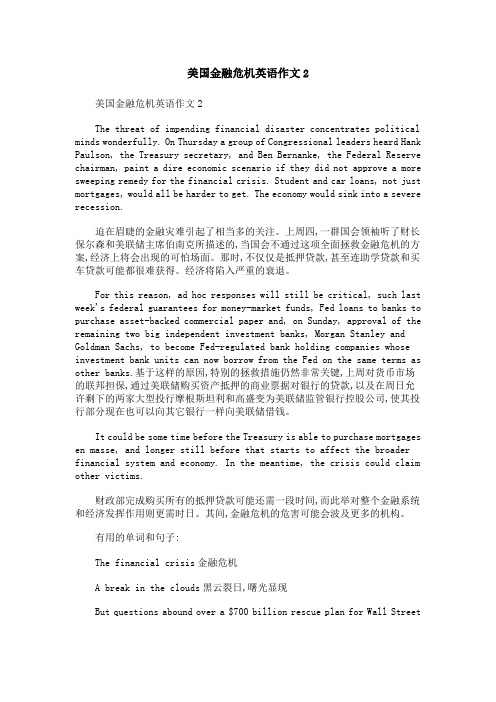
美国金融危机英语作文2美国金融危机英语作文2The threat of impending financial disaster concentrates political minds wonderfully. On Thursday a group of Congressional leaders heard Hank Paulson, the Treasury secretary, and Ben Bernanke, the Federal Reserve chairman, paint a dire economic scenario if they did not approve a more sweeping remedy for the financial crisis. Student and car loans, not just mortgages, would all be harder to get. The economy would sink into a severe recession.迫在眉睫的金融灾难引起了相当多的关注。
上周四,一群国会领袖听了财长保尔森和美联储主席伯南克所描述的,当国会不通过这项全面拯救金融危机的方案,经济上将会出现的可怕场面。
那时,不仅仅是抵押贷款,甚至连助学贷款和买车贷款可能都很难获得。
经济将陷入严重的衰退。
For this reason, ad hoc responses will still be critical, such last week's federal guarantees for money-market funds, Fed loans to banks to purchase asset-backed commercial paper and, on Sunday, approval of the remaining two big independent investment banks, Morgan Stanley and Goldman Sachs, to become Fed-regulated bank holding companies whose investment bank units can now borrow from the Fed on the same terms as other banks.基于这样的原因,特别的拯救措施仍然非常关键,上周对货币市场的联邦担保,通过美联储购买资产抵押的商业票据对银行的贷款,以及在周日允许剩下的两家大型投行摩根斯坦利和高盛变为美联储监管银行控股公司,使其投行部分现在也可以向其它银行一样向美联储借钱。
金融危机 英语作文
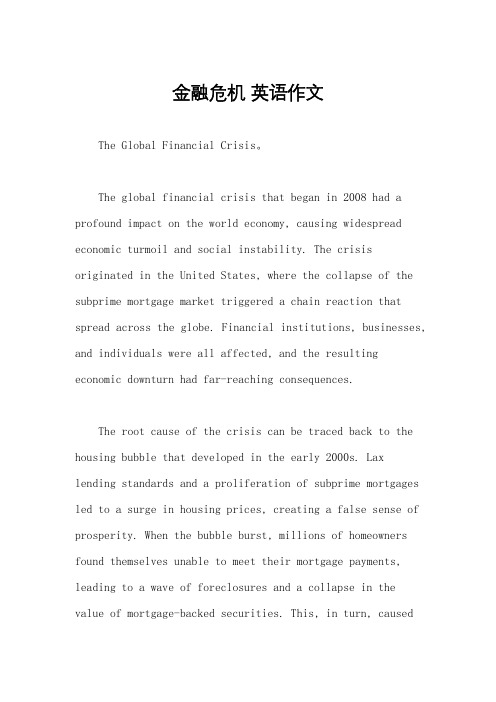
金融危机英语作文The Global Financial Crisis。
The global financial crisis that began in 2008 had a profound impact on the world economy, causing widespread economic turmoil and social instability. The crisis originated in the United States, where the collapse of the subprime mortgage market triggered a chain reaction that spread across the globe. Financial institutions, businesses, and individuals were all affected, and the resulting economic downturn had far-reaching consequences.The root cause of the crisis can be traced back to the housing bubble that developed in the early 2000s. Lax lending standards and a proliferation of subprime mortgages led to a surge in housing prices, creating a false sense of prosperity. When the bubble burst, millions of homeowners found themselves unable to meet their mortgage payments, leading to a wave of foreclosures and a collapse in the value of mortgage-backed securities. This, in turn, causedmassive losses for banks and other financial institutions that had invested heavily in these securities.As the crisis spread, it exposed the fragility of the global financial system. Banks and other financial institutions found themselves dangerously overleveraged, with insufficient capital to cover their losses. This led to a credit crunch, as banks became reluctant to lend to each other or to businesses and consumers. The resulting liquidity crisis had a severe impact on the real economy, causing a sharp contraction in economic activity and a spike in unemployment.Governments and central banks around the world responded with a range of measures to stabilize the financial system and stimulate economic growth. These included bailouts of troubled financial institutions, monetary easing, and fiscal stimulus packages. While these measures helped to prevent a complete meltdown of the financial system, they were unable to prevent a severe recession in many countries.The global financial crisis also had a profound impact on the global economy. International trade and investment contracted sharply, as demand for goods and services dried up. Developing countries, which had been growing rapidly in the years leading up to the crisis, were especially hard hit, as capital flowed out of their economies and commodity prices collapsed. The crisis also exposed thevulnerabilities of the global financial system, leading to calls for reform and greater regulation of financial markets.In conclusion, the global financial crisis of 2008 was a watershed event that had a profound impact on the world economy. It exposed the weaknesses of the global financial system and triggered a severe recession that affected millions of people around the world. While the worst of the crisis may be over, its legacy continues to shape the global economy and the policies of governments and central banks. It serves as a stark reminder of the dangers of financial excess and the need for greater vigilance in the future.。
大学生面对金融危机的英语演讲稿(精选多篇)
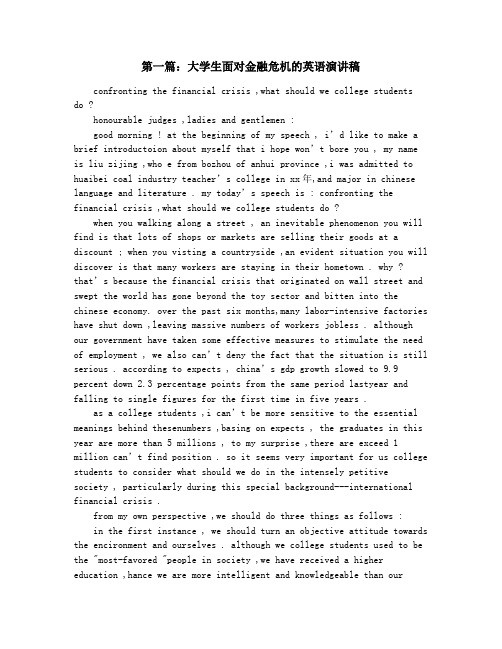
第一篇:大学生面对金融危机的英语演讲稿confronting the financial crisis ,what should we college studentsdo ?honourable judges ,ladies and gentlemen :good morning ! at the beginning of my speech , i’d like to make a brief introductoion about myself that i hope won’t bore you , my nameis liu zijing ,who e from bozhou of anhui province ,i was admitted to huaibei coal industry teacher’s college in xx年,and major in chinese language and literature . my today’s speech is : confronting the financial crisis ,what should we college students do ?when you walking along a street , an inevitable phenomenon you will find is that lots of shops or markets are selling their goods at a discount ; when you visting a countryside ,an evident situation you will discover is that many workers are staying in their hometown . why ? that’s because the financial crisis that originated on wall street and swept the world has gone beyond the toy sector and bitten into the chinese economy. over the past six months,many labor-intensive factories have shut down ,leaving massive numbers of workers jobless . although our government have taken some effective measures to stimulate the need of employment , we also can’t deny the fact that the situation is still serious . according to expects , china’s gdp growth slowed to 9.9 percent down 2.3 percentage points from the same period lastyear and falling to single figures for the first time in five years .as a college students ,i can’t be more sensitive to the essential meanings behind thesenumbers ,basing on expects , the graduates in this year are more than 5 millions , to my surprise ,there are exceed 1 million can’t find position . so it seems very important for us college students to consider what should we do in the intensely petitivesociety , particularly during this special background---international financial crisis .from my own perspective ,we should do three things as follows :in the first instance , we should turn an objective attitude towards the encironment and ourselves . although we college students used to be the "most-favored "people in society ,we have received a higher education ,hance we are more intelligent and knowledgeable than ourcountparts who failed to attend college . society is developing in avery high pace and being more and more advanced , so we shoule know our own strengths and weaknesses and have the right attitude towards ourselves and the job vacancies ,in addition ,we should not attach too much importance to material aspects of the job .secondly ,we should have great ambition towards our future . ambitions are like the stars---we never reach them ,but likemariners ,we chart our course by them . no matter the successful merchant or official or scientist ,they have an idential personality---ambition . on the surfaceof the globe financial crisis , it brings the pessmisitic economic situations , but it still can’t prevent a person who have great ambition achieving his goals . just like george bernard shaw said :"people always blaming their circumstance , the people whoget on in this world are the people who get up and look for the circumstance s they want ,and ,if they can’t find them ,mak e them."last but not the least, we should study to the best of our abilityto acquire knowledge as much as possible . college is a place where we can enrich our knowledge and improve ourselves .as a college student , we should be these who have a strong sense of social responsibilities , up-to-date knowledge and perhensive capabilities .but never idle awayour precious time and make our college life perplexed and vacuous . only master extensive knowledge and lay a solid foundtion can we have a promising and bright future.my fellow friends ,please remember , "heaven never helps the man who will not act " every man is the architect of his own fortune , no matter how wicked the environment is ,i do believe a brilliant and original person still can realize his value and make contribution to our society . thank you very much for your attention !!!第二篇:英语演讲稿(关于金融危机演讲稿)i am honored extremely stand in here for everybody lecture!we all knew that, now the world all is suffering the financial crisis, and many factories all already went out of business the bankruptcy, this also meant could have many people to face is ing off sentry duty.perhaps in school we regarding this realized is not very big, however we soon face the graduation, also meant must look for the work.already some people mented: the next several year university graduate, the graduation also on meant unemployment! although i not like this believed, but i still felt we should have one kind of crisis feeling, by faces the worst possible occurrence.therefore, also cannot again continue to waste in the university period time, that already was may not obtain extremely! therefore i hoped schoolmates, all can learn own diligently special course, in order to might find from now on most suits own work.我很荣幸极为站在这里为大家演讲!我们都知道,现在世界上所有正在遭受金融危机,许多工厂都已经倒闭了破产,这也意味着可能有许多人面对即将关闭站岗,英语演讲稿(关于金融危机演讲稿),演讲稿《英语演讲稿(关于金融危机演讲稿)》。
金融危机英语作文

金融危机英语作文The financial crisis is a big problem. It affects everyone, not just the rich people. It's like a domino effect, one thing leads to another and it just keepsgetting worse. People lose their jobs, businesses go bankrupt, and the whole economy suffers.I remember when the financial crisis hit, it was like a slap in the face. I never thought it would affect me, butit did. I lost my job, and it was really hard to find another one. I had to tighten my belt and cut back on a lot of things. It was a tough time for me and my family.The thing about the financial crisis is that it's not just about money. It's about people's lives. People lose their homes, their savings, and their sense of security.It's a scary time for everyone, and it's hard to see a way out.I think the government needs to do more to help peopleduring the financial crisis. They need to provide more support for those who are struggling, and they need to put in place measures to prevent this from happening again in the future. It's not just about bailing out big banks, it's about helping the little guy too.I hope that we can learn from this financial crisis and make changes for the better. We need to work together to build a stronger, more stable economy that works for everyone, not just the privileged few. It's going to take time, but I believe we can get through this if we all pull together.。
2008年美国 金融危机 英文版

2008年美国金融危机英文版(in English)美国作为世界上第一大经济体,对世界经济的发展具有火车头的作用。
然而2007年美国经济的表现不尽人意,次贷危机的爆发更是雪上加霜。
经济增长速度降低,通货膨胀率升高,失业率增加,这一切显示出美国经济已经离滞胀越来越近了。
美联储前主席格林斯潘称“美国经济尚未陷入滞胀,但已经有早期迹象出现”。
2008 financial crisis (in English)The United States as the world's largest economies, the world's locomotive of economic development. However, in 2007 less than satisfactory performance of the U.S. economy, sub-loan crisis broke out, more difficult. To reduce the rate of economic growth, rising inflation, the rise in unemployment, all show the U.S. economy has been growing from the stagnation of the past. Former Federal Reserve Chairman Alan Greenspan said "stagflation in the U.S. economy has not yet, but already there are early signs appear."次贷危机是美国经济放缓的导火索,其后续影响不断恶化并逐渐波及到世界经济。
2007年世界经济在连续四年的高速增长之后,出现了调整的迹象。
同时,美国、欧元区和广大发展中国家的CPI上涨率已超过央行设定的控制目标。
全球金融危机英语作文
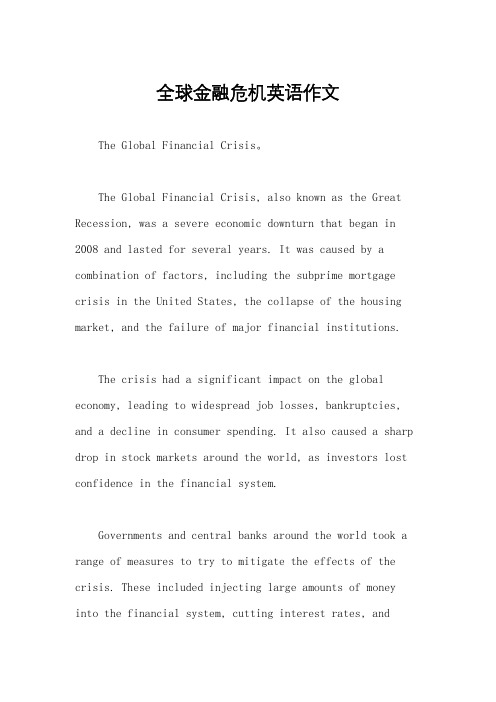
全球金融危机英语作文The Global Financial Crisis。
The Global Financial Crisis, also known as the Great Recession, was a severe economic downturn that began in 2008 and lasted for several years. It was caused by a combination of factors, including the subprime mortgage crisis in the United States, the collapse of the housing market, and the failure of major financial institutions.The crisis had a significant impact on the global economy, leading to widespread job losses, bankruptcies, and a decline in consumer spending. It also caused a sharp drop in stock markets around the world, as investors lost confidence in the financial system.Governments and central banks around the world took a range of measures to try to mitigate the effects of the crisis. These included injecting large amounts of money into the financial system, cutting interest rates, andintroducing stimulus packages to boost economic growth.Despite these efforts, the global economy took several years to recover from the crisis. Many countries experienced prolonged periods of slow growth, high unemployment, and rising debt levels.The crisis also had a significant impact on the waythat governments and financial institutions operate. It led to increased regulation of the banking sector, as well as greater scrutiny of financial products and practices. It also highlighted the need for greater international cooperation to prevent future financial crises.In conclusion, the Global Financial Crisis was a major event in world history that had far-reaching economic and social consequences. Its impact is still being felt today, and it serves as a reminder of the importance of responsible financial management and regulation.。
金融危机的影响英语作文
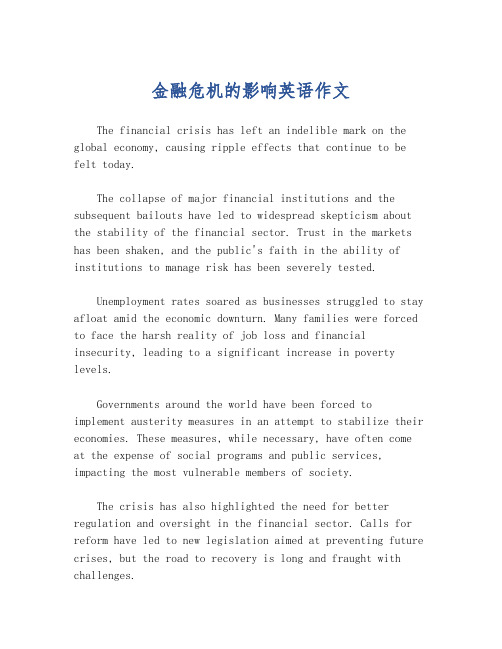
金融危机的影响英语作文The financial crisis has left an indelible mark on the global economy, causing ripple effects that continue to be felt today.The collapse of major financial institutions and the subsequent bailouts have led to widespread skepticism about the stability of the financial sector. Trust in the markets has been shaken, and the public's faith in the ability of institutions to manage risk has been severely tested.Unemployment rates soared as businesses struggled to stay afloat amid the economic downturn. Many families were forced to face the harsh reality of job loss and financial insecurity, leading to a significant increase in poverty levels.Governments around the world have been forced to implement austerity measures in an attempt to stabilize their economies. These measures, while necessary, have often come at the expense of social programs and public services, impacting the most vulnerable members of society.The crisis has also highlighted the need for better regulation and oversight in the financial sector. Calls for reform have led to new legislation aimed at preventing future crises, but the road to recovery is long and fraught with challenges.Innovations in technology and the rise of fintech have offered some hope for a more stable and inclusive financial system. These advancements have the potential to democratize access to financial services and promote greater transparency.The lessons learned from the financial crisis are still being absorbed and applied. It has been a catalyst for change, prompting a reevaluation of economic policies and a renewed focus on the importance of financial literacy.As we move forward, it is crucial to address the root causes of the crisis and to build a more resilient and equitable economic system. The road to recovery is paved with lessons from the past, and it is up to us to ensure that wedo not repeat the mistakes of history.。
金融危机的英语作文
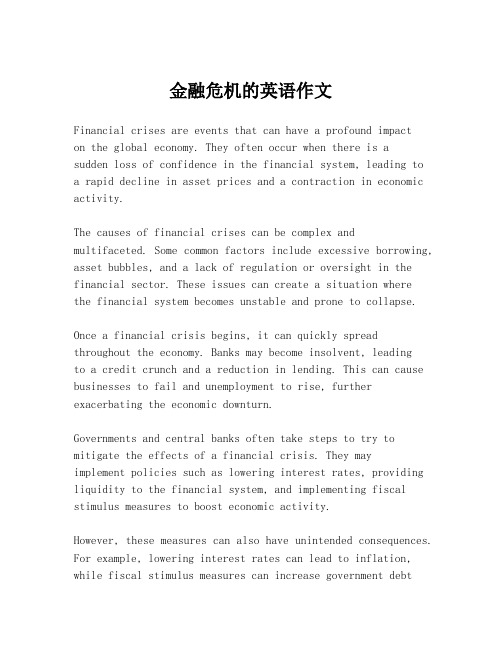
金融危机的英语作文Financial crises are events that can have a profound impacton the global economy. They often occur when there is asudden loss of confidence in the financial system, leading to a rapid decline in asset prices and a contraction in economic activity.The causes of financial crises can be complex and multifaceted. Some common factors include excessive borrowing, asset bubbles, and a lack of regulation or oversight in the financial sector. These issues can create a situation wherethe financial system becomes unstable and prone to collapse.Once a financial crisis begins, it can quickly spread throughout the economy. Banks may become insolvent, leadingto a credit crunch and a reduction in lending. This can cause businesses to fail and unemployment to rise, further exacerbating the economic downturn.Governments and central banks often take steps to try to mitigate the effects of a financial crisis. They mayimplement policies such as lowering interest rates, providing liquidity to the financial system, and implementing fiscal stimulus measures to boost economic activity.However, these measures can also have unintended consequences. For example, lowering interest rates can lead to inflation, while fiscal stimulus measures can increase government debtlevels.In conclusion, financial crises are complex events with far-reaching consequences. Understanding their causes and potential solutions is essential for promoting economic stability and preventing future crises. It is important for policymakers to strike a balance between promoting economic growth and ensuring the stability of the financial system.。
关于金融危机的英语演讲稿三篇

关于金融危机的英语演讲稿三篇演讲稿一:金融危机的起因与教训Ladies and gentlemen,Good morning! Today, I would like to talk about the financial crisis, its causes, and the lessons we have learned from it.The financial crisis that occurred in 2008 was one of the most significant economic events in our history. It originated in the United States but quickly spread across the globe, causing a severe recession that affected millions of people.So, what were the causes of this crisis? One of the primary factors was the housing bubble. Banks and financial institutions were lending money to individuals who could not afford to pay back their mortgages. As a result, when housing prices started to decline, many homeowners defaulted on their loans, leading to a wave of foreclosures. This had a significant impact on the financial sector, as many banks held these risky mortgage-backed securities.Another factor was the excessive risk-taking by financial institutions. They were engaging in complex financial transactions, such as the creation and trading of derivatives, without fully understanding the risks involved. When the housing market collapsed, these institutions faced massive losses, which created a domino effect throughout the financial system.Furthermore, there were regulatory failures that contributed to the crisis. Authorities failed to properly oversee the activities of financial institutions and allowed them to take on excessive leverage. This lack of oversight created an environment where risky behavior was not adequately controlled.The lessons we have learned from this crisis are invaluable. First and foremost, we must ensure that financial institutions are properly regulated. It is crucial to have effective oversight to prevent excessive risk-taking and ensure the stability of the financial system.Secondly, transparency is key. Financial institutions must disclose accurate and timely information about their activities and the risks they undertake. This will allow investors and regulators to make informed decisions and take appropriate actions to mitigate potential risks.Lastly, it is essential to promote financial literacy among the general public. People should have a basic understanding of financial products and be aware of the risks involved. This will help individuals make informed decisions about their personal finances and reduce the likelihood of another crisis.In conclusion, the financial crisis of 2008 was a wake-up call for the global economy. It exposed the flaws in our financial system and highlighted the need for better regulation and transparency. By learning from the mistakes of the past, we can build a more stable and resilient financial system for the future.Thank you for your attention.演讲稿二:金融危机对全球经济的影响和应对措施Ladies and gentlemen,Good afternoon! Today, I would like to discuss the impact of the financial crisis on the global economy and the measures taken to address its consequences.The financial crisis of 2008 had far-reaching effects on the global economy. It caused a severe recession in many countries, leading to a significant increase in unemployment and a sharp decline in economic growth.One of the main consequences of the crisis was the collapse of several major financial institutions. Governments around the world had to step in to bail out these institutions to prevent a complete meltdown of the financial system. This led to a massive increase in public debt, which had long-term implications for fiscal sustainability.Furthermore, the crisis had a profound impact on international trade. As demand plummeted, many countries experienced a sharp decline in exports, leading to a contraction in their economies. The interconnectedness of the global economy meant that the crisis spread rapidly across borders, affecting both developed and developing nations.In response to the crisis, governments and central banks implemented various measures to stabilize their economies. They cut interest rates to stimulate borrowing and spending, and implemented fiscal stimulus packages to boost demand. Additionally, regulatory reforms were introduced to strengthen the oversight of financial institutions and prevent a similar crisis from occurring in the future.On the international level, coordinated efforts were made to address the crisis. The G20, for example, played a crucial role in promoting cooperation among countries and implementing measures to restore confidence in the global financial system. International financial institutions, such as the InternationalMonetary Fund, provided financial assistance to countries in need and facilitated the restructuring of their economies.While these measures were successful in mitigating the immediate impact of the crisis, challenges still remain. The global economy is still recovering from the aftermath of the crisis, and many countries are facing long-term structural issues, such as high levels of public debt and increasing inequality.Looking forward, it is essential to continue strengthening the resilience of the global financial system. This includes implementing reforms to improve the regulation and supervision of financial institutions, enhancing transparency and accountability, and promoting sustainable economic growth.In conclusion, the financial crisis of 2008 had profound and lasting effects on the global economy. While significant progress has been made in addressing its consequences, there is still work to be done. By learning from the past and implementing the necessary reforms, we can build a more stable and prosperous global economy.Thank you for your attention.演讲稿三:金融危机对个人理财的影响和应对策略Ladies and gentlemen,Good evening! Today, I would like to discuss the impact of the financial crisis on personal finance and share some strategies to navigate through these challenging times.The financial crisis of 2008 had a profound impact on individuals and their personal finances. Many people lost their jobs, saw their retirement savings shrink, and struggled to pay off their debts. Thecrisis served as a wake-up call for the importance of sound financial planning and risk management.One of the key lessons from the crisis is the need for diversification. It is crucial to spread your investments across different asset classes, such as stocks, bonds, and real estate. By diversifying, you can reduce the risk of significant losses in the event of a market downturn.Furthermore, it is essential to have an emergency fund. This is a pool of money set aside to cover unexpected expenses, such as job loss or medical emergencies. Having a cash buffer can provide peace of mind and help you weather financial storms without having to rely on credit or sell investments at a loss.Additionally, the crisis highlighted the importance of financial literacy. It is crucial to educate yourself about personal finance and make informed decisions about your money. This includes understanding the risks and rewards of different investment options, managing debt responsibly, and budgeting effectively.Another strategy to mitigate the impact of a financial crisis is to focus on long-term goals. While it is natural to be concerned about short-term market fluctuations, it is important to stay focused on your long-term financial objectives. By maintaining a long-term perspective, you can avoid making impulsive decisions based on short-term market volatility.Finally, seeking professional advice can be beneficial during times of uncertainty. Financial advisors can provide guidance and help you develop a personalized financial plan based on your individual circumstances and goals. They can also provide objective adviceand help you make rational decisions when emotions are running high.In conclusion, the financial crisis of 2008 had a significant impact on personal finance. However, by adopting sound financial strategies, such as diversification, building an emergency fund, and focusing on long-term goals, individuals can navigate through challenging times and secure their financial future.Thank you for your attention.。
金融危机给各行各业带来的影响英语作文
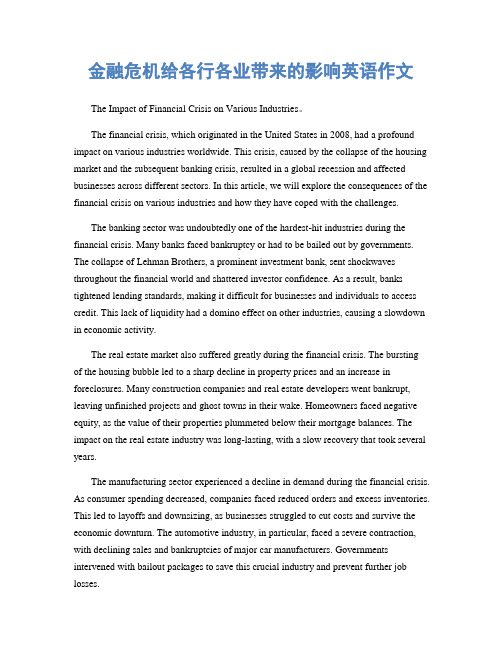
金融危机给各行各业带来的影响英语作文The Impact of Financial Crisis on Various Industries。
The financial crisis, which originated in the United States in 2008, had a profound impact on various industries worldwide. This crisis, caused by the collapse of the housing market and the subsequent banking crisis, resulted in a global recession and affected businesses across different sectors. In this article, we will explore the consequences of the financial crisis on various industries and how they have coped with the challenges.The banking sector was undoubtedly one of the hardest-hit industries during the financial crisis. Many banks faced bankruptcy or had to be bailed out by governments. The collapse of Lehman Brothers, a prominent investment bank, sent shockwaves throughout the financial world and shattered investor confidence. As a result, banks tightened lending standards, making it difficult for businesses and individuals to access credit. This lack of liquidity had a domino effect on other industries, causing a slowdown in economic activity.The real estate market also suffered greatly during the financial crisis. The burstingof the housing bubble led to a sharp decline in property prices and an increase in foreclosures. Many construction companies and real estate developers went bankrupt, leaving unfinished projects and ghost towns in their wake. Homeowners faced negative equity, as the value of their properties plummeted below their mortgage balances. The impact on the real estate industry was long-lasting, with a slow recovery that took several years.The manufacturing sector experienced a decline in demand during the financial crisis. As consumer spending decreased, companies faced reduced orders and excess inventories. This led to layoffs and downsizing, as businesses struggled to cut costs and survive the economic downturn. The automotive industry, in particular, faced a severe contraction, with declining sales and bankruptcies of major car manufacturers. Governments intervened with bailout packages to save this crucial industry and prevent further job losses.The retail industry also felt the effects of the financial crisis. As consumers tightened their belts and prioritized essential spending, discretionary purchases declined significantly. Retailers faced declining sales and had to resort to heavy discounts and promotions to attract customers. Many small businesses were unable to survive the downturn and closed their doors permanently. E-commerce, however, emerged as a winner during this period, as consumers turned to online shopping for convenience and better deals.The service sector, including tourism and hospitality, was hit hard by the financial crisis. With reduced consumer spending, people cut back on travel and leisure activities. Hotels, airlines, and restaurants experienced a significant drop in bookings and revenues. Many tourism-dependent economies suffered, as international visitors dwindled. Governments implemented stimulus measures and marketing campaigns to revive the tourism industry, but recovery was slow and gradual.The financial crisis also had a profound impact on the job market. Unemployment rates soared as companies downsized and laid off employees. Job seekers faced fierce competition and limited opportunities. Many individuals had to settle for lower-paying jobs or remained unemployed for extended periods. The crisis also led to a decrease in wages and benefits, as companies sought to cut costs and maintain profitability.In conclusion, the financial crisis of 2008 had far-reaching consequences on various industries. The banking sector faced collapse, the real estate market crumbled, manufacturing and retail sectors experienced declines, the service industry suffered, and the job market was severely impacted. While some industries have managed to recover over time, the scars of the financial crisis continue to linger, reminding us of the importance of prudent financial management and regulatory oversight.。
金融危机 英文作文

金融危机英文作文The financial crisis hit the global economy hard, causing widespread panic and uncertainty. Stock markets plummeted, banks collapsed, and businesses struggled to survive. It was a time of great turmoil and fear for many people.Many individuals and families suffered as a result of the financial crisis. Jobs were lost, homes were foreclosed, and savings were wiped out. The impact was felt across all sectors of society, and the effects were long-lasting.Governments around the world scrambled to findsolutions to the financial crisis. Bailouts were issued, regulations were tightened, and new policies were implemented to prevent a similar crisis from happening in the future. It was a time of great change and reform in the financial industry.The financial crisis also exposed the flaws andweaknesses in the global financial system. It revealed the dangers of excessive risk-taking, the lack of transparency, and the interconnectedness of financial institutions. It was a wake-up call for the world to reevaluate and rethink the way the financial system operates.Despite the hardships and challenges brought about by the financial crisis, there were also valuable lessons learned. It forced individuals, businesses, and governments to become more resilient, adaptable, and cautious in their financial decisions. It was a period of growth and transformation for many.。
金融危机英文作文

金融危机英文作文The financial crisis, a term that strikes fear into the hearts of many, is a global phenomenon that can cause economic downturns and widespread unemployment. It's a time when the value of money, investments, and assets plummet, leaving many in financial distress.The roots of a financial crisis can be multifaceted, ranging from poor regulatory oversight to the collapse of major financial institutions. It often begins with a ripple effect, where a single event, such as a bank's failure, can trigger a chain reaction of economic instability.During a financial crisis, the impact is felt across all sectors of the economy. Businesses struggle to stay afloat, consumers cut back on spending, and governments scramble to implement policies to stabilize the market. The effects are far-reaching, from the loss of jobs to the reduction inpublic services.One of the most significant challenges during a financial crisis is the potential for a loss of confidence in the economy. When people lose faith in the system, it can lead to a further decline in spending and investment, exacerbating the situation.However, crises also present opportunities for reform and innovation. They can lead to the implementation of newfinancial regulations, the rise of new industries, and the development of new technologies to mitigate future risks.Recovery from a financial crisis is a gradual processthat requires patience and strategic planning. It involves rebuilding trust in the financial system, stabilizing markets, and fostering an environment conducive to growth and investment.In conclusion, financial crises are complex events that test the resilience of economies and societies. They demand a collective response, with governments, businesses, and individuals working together to navigate through the challenges and emerge stronger on the other side.。
金融危机英文作文
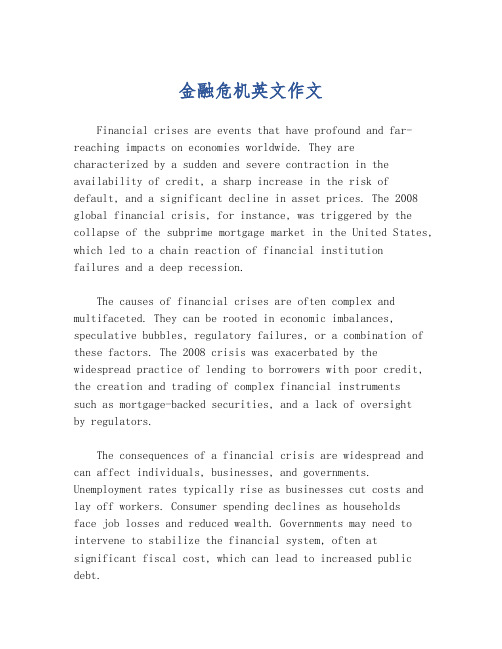
金融危机英文作文Financial crises are events that have profound and far-reaching impacts on economies worldwide. They arecharacterized by a sudden and severe contraction in the availability of credit, a sharp increase in the risk of default, and a significant decline in asset prices. The 2008 global financial crisis, for instance, was triggered by the collapse of the subprime mortgage market in the United States, which led to a chain reaction of financial institutionfailures and a deep recession.The causes of financial crises are often complex and multifaceted. They can be rooted in economic imbalances, speculative bubbles, regulatory failures, or a combination of these factors. The 2008 crisis was exacerbated by the widespread practice of lending to borrowers with poor credit, the creation and trading of complex financial instrumentssuch as mortgage-backed securities, and a lack of oversightby regulators.The consequences of a financial crisis are widespread and can affect individuals, businesses, and governments. Unemployment rates typically rise as businesses cut costs and lay off workers. Consumer spending declines as householdsface job losses and reduced wealth. Governments may need to intervene to stabilize the financial system, often at significant fiscal cost, which can lead to increased public debt.Recovery from a financial crisis is often a long and arduous process. It requires a combination of monetary and fiscal policies aimed at restoring confidence, stimulating economic growth, and preventing future crises. This caninclude measures such as lowering interest rates,implementing fiscal stimulus packages, and reformingfinancial regulations to enhance stability and transparency.Preventing financial crises requires a proactive approach. It involves strengthening the regulatory framework, promoting financial literacy, and encouraging responsible lending and borrowing practices. By learning from past crises and implementing robust preventive measures, economies can be better prepared to withstand financial shocks and maintainlong-term stability.In conclusion, financial crises pose significant challenges to economic stability and prosperity.Understanding their causes, managing their effects, and implementing measures to prevent future occurrences arecrucial for ensuring the health and resilience of the global economy.。
美国遇到金融危机英语作文

美国遇到金融危机英语作文在金融危机这个话题上,网上下载的范文可能有很多种,但我会尽力提供一个高质量的仿写。
以下是我撰写的一篇英语作文,参考了一些常见的观点和论据,希望对你有所帮助:Title: The Impact of the Financial Crisis on the United States。
Introduction:The 2008 financial crisis, also known as the Global Financial Crisis, had far-reaching effects on the United States economy and the global financial system. Triggered by the collapse of the housing bubble, this crisis led to widespread economic turmoil and highlighted the vulnerabilities within the financial sector.Body:1. Causes of the Crisis:The roots of the financial crisis can be traced back to various factors. One of the primary causes was the proliferation of subprime mortgages and the subsequent housing market collapse. Financial institutions engaged in risky lending practices, fueling a housing bubble that eventually burst, causing widespread defaults and foreclosures.Additionally, deregulation of the financial industry allowed for the creation of complex financial instruments, such as mortgage-backed securities and collateralized debt obligations, which obscured the true risks and led to a mispricing of assets. This lack of transparency andoversight contributed to the severity of the crisis.2. Impact on the Economy:The consequences of the financial crisis were severe and long-lasting. The United States experienced a sharp contraction in economic activity, marked by a significant increase in unemployment and a decline in consumer spending.Many Americans lost their homes, retirement savings, and jobs, exacerbating income inequality and poverty levels.Moreover, the crisis had a ripple effect on the global economy, causing a synchronized downturn in other countries. International trade contracted, financial markets plummeted, and governments around the world implemented stimulus measures to mitigate the damage.3. Government Response:In response to the crisis, the U.S. government intervened with a series of unprecedented measures aimed at stabilizing the financial system and stimulating economic growth. The Troubled Asset Relief Program (TARP) provided funds to troubled financial institutions, while the Federal Reserve implemented monetary policies to lower interest rates and inject liquidity into the banking system.Additionally, Congress passed the Dodd-Frank Wall Street Reform and Consumer Protection Act, which aimed to regulate the financial industry more effectively andprevent future crises. These policy interventions helped stabilize the economy in the short term but raised questions about the long-term sustainability of government debt and the effectiveness of regulatory reforms.4. Lessons Learned:The financial crisis of 2008 exposed fundamental flaws in the financial system and highlighted the need for stronger regulation and oversight. It underscored the interconnectedness of global financial markets and the risks associated with excessive leverage and speculative behavior.Moving forward, policymakers must remain vigilant and implement measures to address systemic risks and promote financial stability. This includes enhancing transparency, strengthening capital requirements, and monitoring emerging risks in the financial system.Conclusion:The 2008 financial crisis was a watershed moment in economic history, with profound implications for the United States and the global economy. While the immediate impacts have subsided, the lessons learned from this crisis continue to shape policy discussions and efforts to prevent future financial catastrophes. By learning from past mistakes and implementing prudent reforms, we can strive to build a more resilient and stable financial system for future generations.。
有关金融危机的英语作文

金融危机的英语作文有关金融危机的英语作文导语:金融危机指的是金融资产或金融机构或金融市场的危机,下面是yuwenmi小编为大家整理的优秀作文,欢迎阅读与借鉴,谢谢!What Caused The Financial Crisis?I think we can sum up the cause of our current economic crisis in one word — GREED.Over the years, mortgage lenders were happy to lend money to people who couldn‘t afford their mortgages. But they did it anyway because there was nothing to lose. These lenders were able to charge higher interest rates and make more money on sub-prime loans. If the borrowers default,they simply seized the house and put it back on the market. On top of that, they were able to pass the risk off to mortgage insurer or package these mortgages as mortgage-backed securities. Easy money!and what went wrong with our financial system?The whole thing was one big scheme. Everything was great when houses were selling like hot cakes and their values go up every month. Lenders made it easier to borrow money,and the higher demand drove up house values. Higher house values means that lenders could lend out even bigger mortgages, and it also gave lenders some protection against foreclosures. All of this translates into more money for the lenders, insurers, and investors. Unfortunately, many borrowers got slammed when their adjustable mortgage finally adjusted. When too many of them couldn‘t afford to make their payments, it causes these lenders to suffer from liquidity issue and to sit on more foreclosures than they could sell. Mortgage-backed securities became more risky and worth less causing investment firms likeLehman Brothers to suffer.Moreover,insurers like AIG who insured these bad mortgages also got in trouble. The scheme worked well, but it reverses course and is now coming back to hurt everyone with a vengeance.。
- 1、下载文档前请自行甄别文档内容的完整性,平台不提供额外的编辑、内容补充、找答案等附加服务。
- 2、"仅部分预览"的文档,不可在线预览部分如存在完整性等问题,可反馈申请退款(可完整预览的文档不适用该条件!)。
- 3、如文档侵犯您的权益,请联系客服反馈,我们会尽快为您处理(人工客服工作时间:9:00-18:30)。
美国金融危机英语作文2
美国金融危机英语作文2
The threat of impending financial disaster concentrates political minds wonderfully. On Thursday a group of Congressional leaders heard Hank Paulson, the Treasury secretary, and Ben Bernanke, the Federal Reserve chairman, paint a dire economic scenario if they did not approve a more sweeping remedy for the financial crisis. Student and car loans, not just mortgages, would all be harder to get. The economy would sink into a severe recession.
迫在眉睫的金融灾难引起了相当多的关注。
上周四,一群国会领袖听了财长保尔森和美联储主席伯南克所描述的,当国会不通过这项全面拯救金融危机的方案,经济上将会出现的可怕场面。
那时,不仅仅是抵押贷款,甚至连助学贷款和买车贷款可能都很难获得。
经济将陷入严重的衰退。
For this reason, ad hoc responses will still be critical, such last week's federal guarantees for money-market funds, Fed loans to banks to purchase asset-backed commercial paper and, on Sunday, approval of the remaining two big independent investment banks, Morgan Stanley and Goldman Sachs, to become Fed-regulated bank holding companies whose investment bank units can now borrow from the Fed on the same terms as other banks.基于这样的原因,特别的拯救措施仍然非常关键,上周对货币市场的联邦担保,通过美联储购买资产抵押的商业票据对银行的贷款,以及在周日允许剩下的两家大型投行摩根斯坦利和高盛变为美联储监管银行控股公司,使其投行部分现在也可以向其它银行一样向美联储借钱。
It could be some time before the Treasury is able to purchase mortgages en masse, and longer still before that starts to affect the broader financial system and economy. In the meantime, the crisis could claim other victims.
财政部完成购买所有的抵押贷款可能还需一段时间,而此举对整个金融系统和经济发挥作用则更需时日。
其间,金融危机的危害可能会波及更多的机构。
有用的单词和句子:
The financial crisis金融危机
A break in the clouds黑云裂日,曙光显现
But questions abound over a $700 billion rescue plan for Wall Street
有关7000亿美元华尔街拯救的问题仍然不少。
Mr Paulson's plan is stunning in its brevity and audacity. 保尔森的简洁和大胆令人惊讶不已。
